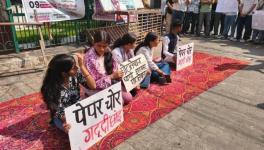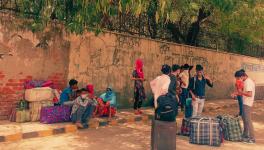India’s Educated Unemployed Prefer Govt Jobs To Private Ones, Finds New Survey

New Delhi: As unemployment soars, every year millions of educated youngsters continue preparing for and giving competitive exams for a small and shrinking pool of government jobs.
A new survey by the Centre for Equity Studies (CES) released on May 6 throws light on the problems of the educated unemployed across three North Indian cities of Delhi, Jaipur and Allahabad — focussing specifically on those competing for government jobs.
The field survey was done among 515 respondents across the three cities that are also coaching hubs for competitive exams for government posts.
Titled “Between Aspiration & Despair: Government Jobs & The Predicament of The Educated Unemployed”, the survey report says that the aim was “to better understand the experience, challenges, social background, investment (of time and money) and expectations of the educated unemployed jostling for jobs.”
Of the total respondents, 72% were graduates while 19% were post-graduates.
The survey revealed that not only do the majority of the educated unemployed prefer government jobs over private ones, but in fact they view the private sector rather negatively — as less secure, more exploitative, and as paying lesser for longer hours.
“The perception of jobs in the private sector is dominantly negative. Many respondents who previously worked in the private sector reported their working conditions to be undesirably exploitative and wages below par,” says the report.
The report quotes a youngster named Kishore from Allahabad as he describes his experience of working in the private industry:
“After a diploma in Polytechnic, I went off to Chennai to work in a plant. There were 20-25 of us who went together. But having reached, we found the conditions no similar to what we were told. It required us to do 12-hour shifts for too less a salary.”
He said all among those who had joined, except for the most economically hard-pressed ones, left the plant within a week. Kishore felt that his three years of diploma was a “waste”. As the report says, “it was only good enough to fetch sub-human jobs. And hence he started taiyaari (preparation) for sarkari naukri (government job).”
What’s more, the educated unemployed also do not agree that privatisation is the answer to the raging joblessness in the country — let’s not forget the recently ‘leaked’ National Sample Survey Organisation’s report that pegged unemployment at a 45-year high.
Also Read: Thwarted NSSO Report Pegs Unemployment Rate at 4-Decade High of 6.1% in 2017-18
“Across the cities we find a largely negative perception of our respondents vis-à-vis privatization as a “solution” to the prevailing job crisis,” the report says.
“Instead, a fairly large share of them consider the filling up of vacancies and further expansion of state jobs as the way forward.”
Indeed, as recent reports indicate that vacancies in the central government positions alone run up to 24 lakh.
What’s more, the youngsters “indicated a preference for legal guarantees for work as in an Urban job guarantee or an employment guarantee for graduates.”
Not surprisingly, 71% of the surveyed educated youths thought that the Narendra Modi-led Bharatiya Janata Party government had failed to create adequate number of jobs, while 18% believed the opposite and 11% were unsure.
The survey also underlines the fact that the urgency to simply land a job trumps the kind of job one gets. This is understandable. Remember last year when thousands of educated youngsters (54,230 graduates; 28,050 postgraduates and 3,740 PhD holders) had applied for 62 posts of messenger peon with the UP Police?
The survey reports that the rate of success in clearing exams and securing a job has fallen in recent years — even as the people’s faith in the selection and recruitment processes has diminished. The reasons attributed include “the lack of transparency in the aftermath of major scams and regular leaks, etc.” Remember the Staff Selection Commission (SSC) exam paper leak scam last year and the protests that followed?
Also Read: Lakhs Of Youngsters To Protest In Delhi Against Corruption in Govt Job Recruitments
In the survey, 39% of the respondents claimed that the selection process was not fair (21% said ‘not fair at all’ while 18% said ‘not fair’).
The report quotes a coaching instructor as saying, “The confidence in fair evaluation has deteriorated since 2014 and have further taken a dent since 2016.”
Further, 65% of the respondents were from a rural background, and they felt that “competitors from rural areas face a relative disadvantage in course of their preparations.” Only students from families that are economically relatively better off can go to bigger cities in order to prepare for exams.
The survey also found a “wide variation in the class composition of competitors in Delhi, Jaipur and Allahabad.”
Competitors belonging to the upper income group was highest in Delhi, falling in Jaipur and falling further in Allahabad.
There is also an overlap of class with rural background. The survey shows “that Delhi sees the lowest proportion of competitors from rural background (50%) while the proportion is 87% in Jaipur and 92% in Allahabad.”
Also read: What Is The State Of Employment In India?
A total of 37% of the respondents reported agriculture as their primary means of family income. In Delhi it was 22% while in Jaipur and Allahabad it is 55% and 71%, respectively.
The survey found that “upper castes and OBCs dominate the ranks of the competitors forming 40% each of our entire sample.”
The proportion of upper castes candidates was highest in Delhi at 52%, it reduced to 24% in Jaipur and further to 15% in Allahabad.
The proportion of OBCs increased from 33% in Delhi to 47% in Jaipur and 58% in Allahabad. Meanwhile, the Scheduled Castes (SCs) constituted only 9.5% of the sample while Scheduled Tribes made up just 8%.
Muslims seem to be even more under-represented among government job aspirants sitting for competitive exams, found the survey, as their proportion in the sample was a mere 4.66%.
Get the latest reports & analysis with people's perspective on Protests, movements & deep analytical videos, discussions of the current affairs in your Telegram app. Subscribe to NewsClick's Telegram channel & get Real-Time updates on stories, as they get published on our website.
























